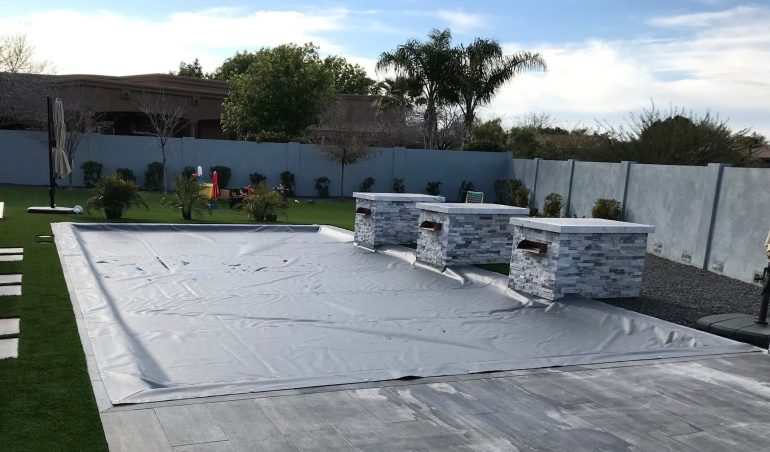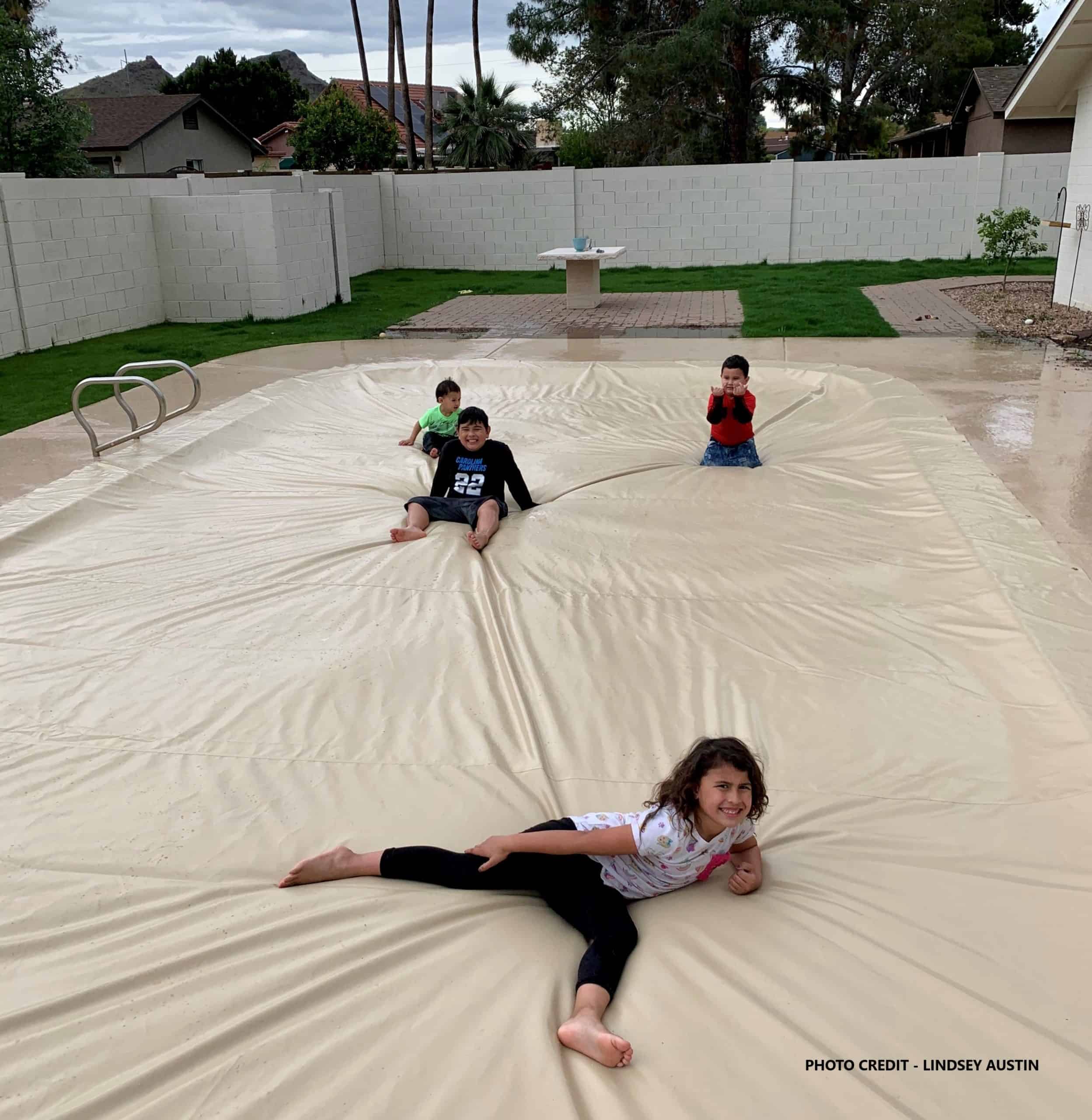Pool covers are an essential accessory for any pool owner. They serve multiple purposes, including keeping debris out of the water, reducing water evaporation, and preventing accidents. Pool covers come in various shapes, sizes, and materials, and choosing the right one can make a significant difference in terms of maintenance, safety, and energy savings.
One of the primary benefits of pool covers is that they help keep the water clean and clear. Leaves, twigs, insects, and other debris can quickly accumulate on the surface of the water, making it unappealing and unsanitary. A pool cover acts as a barrier, preventing debris from falling into the water and reducing the need for frequent cleaning. This not only saves time and effort but also helps keep the pool water healthy and safe for swimming.
Another advantage of pool covers is that they can help reduce water evaporation, which can save money and conserve resources. When exposed to sunlight and wind, pool water can evaporate quickly, leading to a significant loss of water and heat. By covering the pool when not in use, pool owners can reduce water loss by up to 90%, which can result in significant energy savings and lower water bills. Additionally, pool covers can help maintain water temperature, reducing the need for heating and further reducing energy costs.
Types of Pool Covers
Pool covers come in different types, each with its own set of pros and cons. Here are the most common types of pool covers:
Winter Pool Covers
Winter pool covers are designed to protect your pool during the off-season. They are usually made of heavy-duty vinyl or mesh material that can withstand harsh weather conditions. These covers are typically held in place by water bags or anchors around the pool’s perimeter. Winter pool covers are affordable and easy to install, but they require regular maintenance to prevent water from accumulating on top.
Solar Pool Covers
Solar pool covers are designed to trap the sun’s heat and transfer it to your pool water, keeping it warm and comfortable. These covers are usually made of lightweight, UV-resistant material that floats on the water’s surface. They are easy to install and remove, but they require direct sunlight to be effective. Solar pool covers are an eco-friendly option that can save you money on heating costs.
Safety Pool Covers
Safety pool covers are designed to prevent accidental drowning and keep your pool clean. These covers are usually made of heavy-duty mesh or solid material that is anchored to the pool deck. They can support the weight of a child or pet without collapsing, making them a great safety feature for families with young children or pets. Safety pool covers are more expensive than other types of covers, but they are worth the investment for peace of mind.
Automatic Pool Covers
Automatic pool covers are designed to provide convenience and safety. These covers are usually made of vinyl or mesh material that is attached to a motorized reel system. With just the press of a button, the cover can be opened or closed, making it easy to use. Automatic pool covers are more expensive than other types of covers, but they provide the ultimate convenience and safety for pool owners.
In conclusion, each type of pool cover has its own set of advantages and disadvantages. The best type of pool cover for you will depend on your specific needs and budget. Consider the climate in your area, how often you use your pool, and your safety concerns when choosing a pool cover.
Benefits of Pool Covers
Pool covers offer numerous benefits to pool owners. In this section, we will discuss some of the most significant advantages of having a pool cover.
Reduced Maintenance Costs
Pool covers can significantly reduce maintenance costs. By keeping out debris and leaves, pool covers reduce the need for frequent cleaning. This means less time and money spent on cleaning and maintenance.
Energy Savings
Pool covers can also help save energy. By covering the pool when it is not in use, pool covers reduce the amount of heat lost through evaporation. This can lead to significant energy savings, especially for those who heat their pools. According to the US Department of Energy, pool covers can reduce heating costs by 50-70%.
Water Conservation
Pool covers can also help conserve water. Evaporation is responsible for up to 70% of water loss in pools and spas. By covering the pool, pool owners can significantly reduce water loss due to evaporation. This means less water used and less money spent on water bills.
Safety and Security
Pool covers can provide an added layer of safety and security. They can prevent accidental drowning and keep out unwanted visitors. This is especially important for families with young children or pets.
In summary, pool covers offer numerous benefits to pool owners, including reduced maintenance costs, energy savings, water conservation, and improved safety and security. Investing in a pool cover can be a wise decision for any pool owner looking to save time, money, and resources.
Factors to Consider When Choosing a Pool Cover
When choosing a pool cover, there are several factors to consider. These factors include the pool size and shape, budget, climate, and maintenance requirements.
Pool Size and Shape
The size and shape of the pool is an important consideration when choosing a pool cover. Pool covers come in different sizes and shapes, so it is important to choose a cover that fits the pool properly. A cover that is too small will not provide adequate protection, while a cover that is too large will be difficult to install and remove.
Budget
Budget is another important consideration when choosing a pool cover. Pool covers come in different materials and styles, and the cost can vary significantly. Vinyl tarps are the most basic and budget-friendly option, while automatic covers are the most expensive. It is important to choose a cover that fits within the budget while still providing adequate protection.
Climate
Climate is another important factor to consider when choosing a pool cover. In areas with harsh winters, a cover that can withstand heavy snow and ice is important. In areas with a lot of sunlight, a cover that provides UV protection is important. It is important to choose a cover that is appropriate for the climate in which the pool is located.
Maintenance Requirements
Maintenance requirements are also an important consideration when choosing a pool cover. Some covers require more maintenance than others. For example, solid covers require more maintenance than mesh covers. It is important to choose a cover that fits within the maintenance requirements of the pool owner.
In summary, when choosing a pool cover, it is important to consider the pool size and shape, budget, climate, and maintenance requirements. By taking these factors into consideration, pool owners can choose a cover that provides adequate protection while still fitting within their budget and maintenance requirements.
Installation and Maintenance
Pool covers are an essential part of any pool setup. They provide a layer of safety, reduce evaporation, and help keep the pool clean. However, installing and maintaining a pool cover can be a daunting task. This section will discuss some of the key considerations for installation and maintenance.
DIY vs Professional Installation
When it comes to installing a pool cover, homeowners have two options: DIY or professional installation. DIY installation can be a cost-effective option, but it requires a certain level of technical skill and knowledge. It is essential to follow the manufacturer’s instructions carefully to ensure the cover is installed correctly. A poorly installed pool cover can be dangerous and may not provide the intended benefits.
Professional installation is the other option. Hiring a professional installer ensures that the cover is installed correctly and safely. Professional installers have the necessary tools and experience to install the cover quickly and efficiently. However, professional installation can be expensive, and homeowners should factor in the cost when budgeting for their pool setup.
Cleaning and Maintenance Tips
Proper maintenance is crucial to ensure the longevity and effectiveness of a pool cover. Regular cleaning and maintenance can prevent damage and keep the cover functioning correctly. Here are some tips for cleaning and maintaining a pool cover:
- Clean the cover regularly: Use a pool cover cleaner or a mild detergent and a soft brush to clean the cover. Avoid using abrasive cleaners or brushes that could damage the cover’s surface.
- Maintain proper water balance and chemistry: Ensure that the pool water is properly balanced and chemically treated to prevent algae growth and other issues that could damage the cover.
- Check the tracks and mechanism: Clean the tracks and lubricate the mechanism regularly to prevent wear and tear and ensure smooth operation.
- Remove debris promptly: Remove debris such as leaves and branches from the cover as soon as possible to prevent damage and blockages.
- Inspect the cover regularly: Inspect the cover for signs of wear and tear, such as tears or holes. Repair or replace the cover as necessary to prevent further damage.
In conclusion, installing and maintaining a pool cover requires careful consideration and attention to detail. Homeowners should weigh the pros and cons of DIY vs professional installation and follow the manufacturer’s instructions carefully. Regular cleaning and maintenance can prevent damage and ensure the cover functions correctly.
Conclusion
Pool covers are an essential part of pool maintenance and safety. They protect the pool from debris, weather, and sunlight, and can also keep the water warm in cold weather. There are several types of pool covers available, each with its own advantages and disadvantages.
A standard winter cover is the most affordable option, but it needs a pump on top, keeps out sunlight and light debris, and lasts 1-3 seasons. A mesh security cover costs more but doesn’t need a pump on top, keeps out debris but not water, and lasts 10-15 years. A solid vinyl security cover also costs more but offers the best protection against debris and water, and lasts 10-15 years.
When choosing a pool cover, it’s important to consider the climate, weather, and pool usage. For example, a tighter weave safety cover is best suited for mild to moderate winter areas with modest snowfall, such as the Pacific Northwest.
Pool covers also help to minimize evaporation and reduce pool heating costs. Covering a pool when it is not in use is the single most effective means of reducing pool heating costs, with savings of 50%-70% possible.
In summary, pool covers are an investment in the longevity and safety of a pool. By choosing the right type of cover for your pool and using it consistently, you can protect your pool from debris and weather, reduce pool heating costs, and enjoy a cleaner and safer swimming experience.






